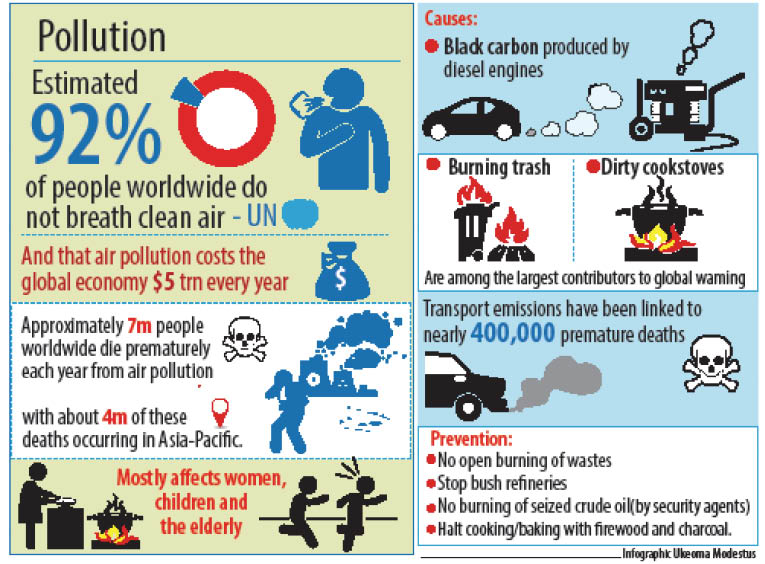World Environment Day: ‘Beat Air Pollution’
Nigeria joins the rest of the world today in the celebration of the 2019 World Environment Day (WED) with theme, ‘Beat Air Pollution’ – a call to action to end pollution of the environment. This year’s topic invites everyone to consider how to change their everyday lives to reduce the amount of air pollution they […]

Nigeria joins the rest of the world today in the celebration of the 2019 World Environment Day (WED) with theme, ‘Beat Air Pollution’ – a call to action to end pollution of the environment.
This year’s topic invites everyone to consider how to change their everyday lives to reduce the amount of air pollution they produce, and thwart its contribution to global warming and its effects on their own health.
The United Nations designated June 5 every year as WED to provide opportunity to broaden the basis for enlightened opinion and responsible conduct by individuals, enterprises and communities in preserving and enhancing the environment.
Over the years, it has grown to be a broad global platform for public outreach that is widely celebrated by stakeholders in over 100 countries.
It also serves as the ‘people’s day’ for doing something positive for the environment, galvanizing individual actions into a collective power that generates an exponential positive impact on the planet.
This year’s WED will be hosted by China, with theme ‘Air Pollution: We can’t stop breathing, but we can do something about the quality of air’.
Air pollution facts
According to the United Nations, 92 per cent of people worldwide do not breathe clean air and air pollution costs the global economy $5 trillion every year in welfare provision.
Also, the ground-level ozone pollution is expected to reduce staple crop yields by 26 per cent by 2030.
Approximately, 7 million people worldwide die prematurely each year from air pollution, with about 4 million of these deaths occurring in Asia-Pacific.
What affects our air?
Black carbon is produced by diesel engines, burning trash and dirty cookstoves. It is one of the largest contributors to global warning. It is also a dangerous air pollutant. It affects our air, climate and ultimately us, humans.
The main source of household air pollution is the indoor burning of fossil fuels, wood and other biomass-based fuels to cook, heat and light homes. Around 3.8 million premature deaths are caused by indoor air pollution each year, the vast majority of them in the developing world.
In many countries, energy production is a leading source of air pollution. Coal-burning power plants are a major contributor, while diesel generators are a growing concern in off-grid areas.
The global transport sector accounts for almost one quarter of energy-related carbon dioxide emissions and this proportion is rising, says the UN. Transport emissions have been linked to nearly 400,000 premature deaths.
Open waste burning and organic waste in landfills release harmful dioxins, furans, methane and black carbon into the atmosphere. Globally, an estimated 40 percent of waste is openly burnt.
Other sources that are not caused by humans include volcanic eruptions, dust storms and other natural processes.
How to beat air pollution
Governments, industry, communities, and individuals have been urged to come together to explore renewable energy and green technologies, and improve air quality in cities and regions across the world.
An environmentalist and Director of Health of Mother Earth Foundation (HOMEF), Nnimmo Bassey, said many actions are needed to be taken in Nigeria to beat air pollution.
He said individuals and corporations should stop polluting activities at source and enforce air quality standards.
“Government and oil companies should stop gas flaring and stop the soot over Port Harcourt; no open burning of wastes, and stop bush refineries, burning of seized crude oil by security forces and revamp the polluting (official) refineries,” he said.
While urging government to invest in mass transit and get old and polluting vehicles off the roads, he said a switch to renewable energy would greatly cut air pollution, as well as the halting of cooking or baking with firewood or charcoal.
